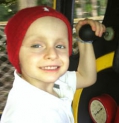Fatigue and Carnitine Levels over Eight Cycles of Chemotherapy in Children and Adolescents.
Fatigue is now recognized as the most frequent symptom experienced by children and adolescents with cancer. As we increase our understanding of fatigue in children and adolescents with cancer, it is important to explore new measurements of this symptom. Carnitine is found in nearly all cells of the body and plays a critical role in energy production. Carnitine deficiencies can cause symptoms such as fatigue, muscle pain and weakness in individuals with cancer. The purpose of this study is to explore carnitine as a physiologic marker for fatigue in 60 children and adolescents with cancer. A repeated-measures research design will be used to evaluate whether children and adolescents receiving cisplatin, ifosfamide or doxorubicin therapy as part of their treatment will experience carnitine deficiency and increased fatigue. Study measurements will be completed at consistent chemotherapy cycle intervals (cycles 2,4,6,8) during the first eight months of chemotherapy. Analyses will be used to determine if the carnitine levels decrease in children and adolescents during the first eight months of chemotherapy treatment and influence fatigue. The possible association of carnitine deficiency and fatigue, recently found in adult cancer patients, may provide an additional physiologic indicator for evaluation of fatigue. If this is found, interventions to decrease nausea by using this micronutrient could be designed that are noninvasive with minimal side effects.

